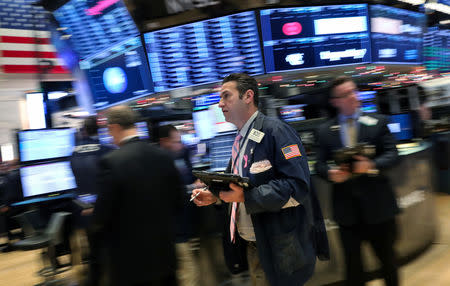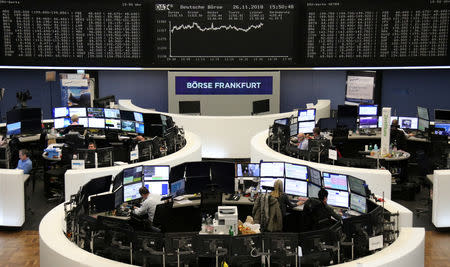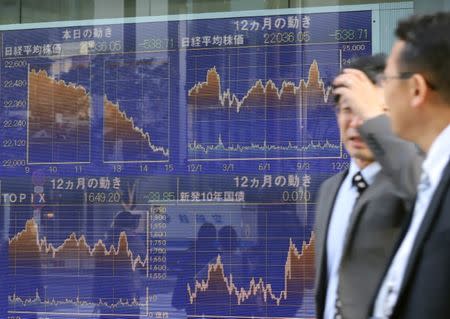World stocks choppy on political sparring, oil climbs
By Chuck Mikolajczak
NEW YORK (Reuters) - A gauge of global stock markets edged higher in volatile trade on Tuesday as investors waded through a chunk of geopolitical headlines, including threats by U.S. President Donald Trump to shut down the government over a funding fight and signs of a thaw in the U.S.-China trade battle.
European shares closed higher, in part from a boost in auto shares, and Wall Street opened on a strong note after a report that China is moving to cut import tariffs on American-made cars, which market participants viewed as a sign China is ready to make concessions on trade.
That report came after Chinese Vice Premier Liu He exchanged views on the next stage of trade talks with U.S. Treasury Secretary Steven Mnuchin and Trade Representative Robert Lighthizer.
But U.S. stocks lost steam after the open and fell further after Trump openly sparred about government funding with the top two Democratic lawmakers during an Oval Office meeting, raising doubts a deal would be possible ahead of a deadline later this month.
"The key drivers of today's volatility are the political and geopolitical headlines," said Carol Schleif, deputy chief investment officer at Abbot Downing in Minneapolis.
"We can't control the headlines but the thing we can lean on is that the underlying fundamentals remain solid," Schleif said.
The S&P 500 traded in a wide range, gaining nearly 1.4 percent at the high and falling 0.62 percent at the low.
The Dow Jones Industrial Average <.DJI> fell 53.02 points, or 0.22 percent, to 24,370.24, the S&P 500 <.SPX> lost 0.94 points, or 0.04 percent, to 2,636.78 and the Nasdaq Composite <.IXIC> added 11.31 points, or 0.16 percent, to 7,031.83.
Germany's DAX <.GDAXI>, which entered bear market territory last week and is Europe's most China-sensitive market, climbed 1.5 percent.
The pan-European STOXX 600 index <.STOXX> rose 1.53 percent, and MSCI's gauge of stocks across the globe <.MIWD00000PUS> gained 0.09 percent, snapping a five-session skid.
The uncertainty over Britain's exit from the European Union, or Brexit, continued to haunt investors and held sterling near 20-month lows after British Prime Minister Theresa May postponed a vote on her deal. On Tuesday, German leader Angela Merkel ruled out further Brexit negotiations but said efforts were being made to give Britain reassurances.
Reports a threshold was reached to trigger a no confidence vote in May sent sterling to a fresh session low.
Sterling <GBP=> was last trading at $1.2481, down 0.62 percent after hitting a low of 1.2479.
After an initial softening, the dollar index <.DXY>, which tracks the U.S. currency against six major peers, rose 0.25 percent, with the euro <EUR=> down 0.31 percent to $1.132.
European bond markets were focused on France a day after President Emmanuel Macron announced wage rises for the poorest workers and tax cuts for pensioners, in further government concessions aimed at defusing weeks of often-violent protests, raising concerns over fiscal spending.
In response, French bond yields rose to their highest spread in 20 months over Germany's yields <DE10FR10=RR>, at 47.81 basis points.
Benchmark 10-year Treasury notes <US10YT=RR> last fell 7/32 in price to yield 2.879 percent, from 2.856 percent late on Monday.
Oil prices rebounded after having sunk on Monday, buoyed by an outage that dented Libyan production, but pared gains on the U.S. government shutdown concerns.
U.S. crude <CLcv1> settled up 1.3 percent at $51.65 per barrel, and Brent <LCOcv1> was last at $60.20, up 0.38 percent.
(Reporting by Chuck Mikolajczak; Additional reporting by Caroline Valetkevitch and Sinead Carew; editing by Leslie Adler and Phil Berlowitz)

 Yahoo News
Yahoo News 


